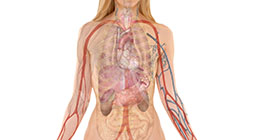
Overview
Symptoms
Causes
Prescription
Health Tips
Diarrhea is classified as the passage of frequent, loose, and watery stools accompanied by an extreme sense of urgency to get to the bathroom. It predominantly affects babies and young children, but most adults have been affected at one time or another. According to the Center for Disease Control and Prevention (CDC), diarrhea is the second leading cause of death worldwide in children under age 5. Diarrhea typically lasts for a few days. Severe, prolonged diarrhea may be due to chronic digestive disorders such as IBS, Crohn’s disease, or colitis.
Symptoms
- Abdominal pain or cramps
- Dehydration
- Fever is possible, and in extreme cases vomiting
- Frequent bowel movements of watery stools, more than three in a day
- Increased thirst
- May or may not be in control of bowel movements
Consult a physician if any diarrhea is still present after two days; there is a fever over 101°F (38°C); stools are bloody or look like tar; there is severe rectal or abdominal pain; dehydration is visibly noticeable, or urination has stopped.
Causes
There is an abundance of causal factors that can contribute to diarrhea because it is not just an illness itself, but also a symptom of other illnesses, such as cancer, diseased pancreas, irritable bowel syndrome, food allergies, grief, stress, Crohn’s disease, colitis, and many other intestinal disorders.
Food poisoning due to ingestion of uncooked meat, unripened fruit, or mishandling of food during preparation is quite common.
When the body fights an infection of viruses, bacteria (E. coli, salmonella), or parasites, it may try expelling them as forcefully as it can.
Many medications list diarrhea as a possible side effect.
Stress can cause waste to move through the intestines more rapidly than normal. Partially undigested food can also promote intestinal irritation promoting diarrhea. Foods or chemicals to which the body is allergic or cannot tolerate may be treated in the same manner.
Another common instigator of diarrhea is a sudden change in water or food consumption when traveling in a different country. This not only occurs when traveling through developing countries where sanitation may be an issue but also in industrialized countries. One’s body may be sensitive to the differences in water purification methods.
Hormone fluctuations or an increase in prostaglandins can cause diarrhea before or during menstruation in some women.
Prescription for Health
Diet
Avoid eating foods that are hard to digest or that will aggravate the problem such as:
- Alcohol
- Apple juice
- Caffeine
- Cruciferous vegetables (broccoli, cauliflower, kale, etc.)
- Dairy
- Fatty foods
- Spicy foods
Instead, choose foods that are easy to digest or have soluble fiber to add bulk to stools so they will travel more slowly through the intestines and minimize dehydration.
- Applesauce
- Bananas
- Baked, broiled, or steamed fish or chicken
- Boiled, mashed, or baked potatoes
- Broth
- Cooked vegetables
- Carrots
- Squash
- Zucchini
- Green beans
- Ground flaxseeds (2 Tbsp/30 mL)
- Oatmeal
- Rice
- Yogurt
Drink herbal teas containing blackberry bark or root, fennel, chamomile, ginger, or raspberry leaf to ease cramps and abdominal discomfort.
Lifestyle
Use anti-diarrhea medications sparingly. They are designed to stop diarrhea by slowing the muscles in the intestines or by absorbing extra water. The toxins the body is trying to eliminate will get absorbed along with the water. With regular use, these medications will also change the body’s natural rhythm of waste elimination by slowing down elimination and increasing the time food is left to putrefy in the intestines.
Homeopathic remedies may be beneficial. Sulfur is for sudden diarrhea; Podophyllum is for watery stools. For diarrhea that is burning and aggravated at night, try Arsenicum album.
A hot water bottle applied to the abdominal area may ease pain and cramping.
| Nutrient | Dosage | Action |
|---|---|---|
| Shepherd’s Purse | Use 2.5 mL to 5 mL in water 3 times daily. As this condition improves, reduce dosage slowly | Used to heal the mucosal membranes of the digestive system and reduces diarrhea |
| Probiotics | Bio K, 1 bottle or 1 capsules daily | Increases friendly bacteria and reduces harmful bacteria. |
| Guar Fiber | 6 to 12 grams daily | Helps to relieve diarrhea and restore regular stool movements |
| Teas containing tannin (green or organic black tea or red raspberry) | Drink strong clear tea throughout the day. Green tea contains theophylline, a muscle relaxant reducing intestinal motility. | Slows and/or halts diarrhea. |
| Oil of oregano | Two drops in ½ cup (125 mL) water twice daily. My family uses oil of oregano when we travel to Mexico and no one gets Montezuma’s revenge. | Effective against parasite- or bacterial-induced diarrhea. |
Health Tips to Enhance Healing
- Avoid dairy products.
- Avoid eating foods that are difficult to digest such as fatty foods.
- Do not drink apple juice as this can exacerbate the situation.
- Dehydration is a danger with diarrhea. Drink plenty of water.
- Drink herbal teas to ease cramps and abdominal discomfort.
- Eat soluble fibre daily such as fresh apples.
- Homeopathic remedies may be beneficial.
- Take digestive enzymes to aid the digestive process.
- Use a hot water bottle to ease cramping.










